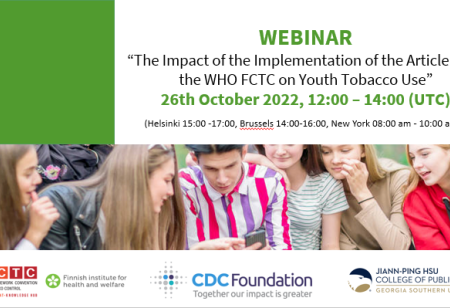
From situation analysis to evaluation – integration of tobacco cessation in TB/HIV programs - 26 May 2020

Written by Elba Esteves, MD, Laura Llambí, PhD, Diego Rodríguez, MSc, Amanda Sica, Psy D, and Beatriz Goja, MD, from the WHO FCTC Knowledge Hub on International Cooperation, Uruguay. A Spanish version of this post if available here.
In the photo, sitting from left to right: Beatriz Goja, MD, Diego Rodríguez, MSc, Elba Esteves, MD, Laura Llambí, PhD, Amanda Sica Psy D. Standing: Miguel Asqueta, MD.
From situation analysis to evaluation – integration of tobacco cessation in TB/HIV programs
Tobacco use increases the risk of developing tuberculosis (TB), and is associated with greater severity and higher mortality of this disease. Smokers have shown to adhere less to treatment, and generate resistance to anti-tuberculosis drugs and a relapse more frequently. Exposure to second-hand smoke increases the risk of tuberculosis at all ages, but with greater impact on children.
Among people living with Human Immunodeficiency Virus (HIV), smoking is associated with lack of adherence to treatment, decreased effectiveness of antiretroviral therapy and worse outcomes. Smokers with HIV lose more years of life from smoking than from viral infection.
The countries most affected by the epidemics of TB and HIV tend to have insufficient health care systems budgets, therefore, they are less likely to invest in measures aimed at preventing non communicable diseases. TB and HIV infections care programs could pave the way for the implementation of integrated set of services aimed at preventing non communicable diseases. Patients who receive advice for cessation and specific recommendations, provided by the professional who treats their TB and / or their HIV infection, increase their likelihood of quitting smoking.
The International Cooperation Center for Tobacco Control was designated as the Knowledge Exchange Hub (KH) of the Secretariat of the WHO Framework Convention on Tobacco Control (WHO FCTC) on International Cooperation, based in Uruguay. Within the framework of a Norwegian-funded project, with the aim of helping countries with the highest prevalence of HIV and / or TB infection to implement the recommendations of Article 14 of the WHO FCTC, the KH developed a manual to strengthen or create the necessary mechanisms for the incorporation of interventions aimed at promoting the cessation of tobacco consumption in the HIV / TB programs, and ensure, to users who require it, the support available for the treatment of their addiction. The manual is available in “Resources” section, in Spanish and English, in the WHO FCTC Implementation Database through this link. The English version can also be directly downloaded from this link.
The key components proposed are:
Recommendation 1: Perform a national situation analysis.
An in-depth analysis of the national situation is necessary in order to observe:
- Level of implementation of the FCTC in the country,
- Degree of implementation of the WHO Policy on TB / HIV collaborative activities
- Status of tobacco dependence treatment services.
- Status of HIV and TB treatment services.
A template for the national situation analysis can be found in ANNEX 1 of the manual.
Recommendation 2: Develop and disseminate broad guidelines.
Considering the national situation analysis, management and clinical guidelines, based on the best available scientific and practical evidence, should be developed and disseminated to promote the integration of the tobacco dependence treatment to HIV and TB treatments. These guidelines cover two main components: a Cessation Strategy and a Clinical Practice Guideline.
Recommendation 3: Carry out comprehensive actions to implement the Cessation Strategy for tobacco consumption.
The gradual implementation of the Strategy is recommended to achieve short-term progress, the order of the proposed activities will depend on the national reality and the priorities of each country.
- Establish a source of sustainable financing for tobacco dependence treatment services.
- Train the health team and other members of the support network of those living with HIV / TB, in brief tobacco intervention.
- Train professionals from various health disciplines, who are interested in specialized treatment, integrating multidisciplinary teams that provide multi-component interventions in tobacco dependence treatment units.
- Use existing systems and resources to ensure the accessibility of the intervention.
- Carry out interventions at the population level. Include cessation of tobacco use in educational interventions, aimed at people living with HIV / TB..
- Implement individual interventions: brief intervention (WHO Strategy 5A and 5R): carry out by primary care professionals. Specialized treatment of tobacco dependence: provided by specially trained professionals, including behavioral and pharmacological support, accessible and affordable.
- Follow up on all patients. Including the monitoring of tobacco consumption (ask and record the tobacco consumption situation) in HIV / TB monitoring and evaluation actions, also aims to assess the impact of cessation on the results of infection treatment. The evidence shows better clinical results in those who quit smoking.
Recommendation 4: Follow up and evaluate the implementation of the Strategy
A phased evaluation is proposed to verify the degree of implementation of the different recommendations: the elaboration of a Cessation Strategy for specific consumption for the target population, based on a Diagnosis of National Situation, the apprehension and its application by health providers and results in the target population.
Ready-to-use monitoring and assessment templates can be found in the manual (ANNEX 6). Each recommendation is accompanied by a specific application methodology, including practical tools and diagnostic and document development templates.
Conclusions
The treatment of tobacco dependence integrated to primary health care, in particular in the programs of treatment of TB and HIV infections, that require close control by the health team, has proven to be a highly cost-effective strategy to improve the results of the three pathologies: TB, HIV and tobacco dependence.
This document prepared by the International Cooperation Center for Tobacco Control of Uruguay, as a WHO FCTC Secretariat’s Knowledge Hub, can be very useful for those Parties that wish to advance in the application of Article 14 of the FCTC in these especially vulnerable populations.
About the authors:
Elba Esteves, MD
Medical Doctor, Specialist in Internal Medicine of the University of the Republic, Uruguay. Master’s Degree in Tobacco Dependence from the University of Seville, Spain. Specialist in Quality Management in Health Services. Head of the Tobacco Dependence Treatment Program of the National Fund of Resources. Member of the National Advisory Commission for Tobacco Control of the Ministry of Health. Technical Advisor of the International Cooperation Center for Tobacco Control (knowledge hub of the Secretariat of the WHO Framework Convention on Tobacco Control). She has participated, in international cooperation, in the implementation of Article 14 of FCTC and in capacity building in Minimal Intervention for tobacco dependence treatment.
Laura Llambí, PhD
Associate Professor, Smoking Cessation Unit, Hospital de Clínicas, Medicine School, University of the Republic, Uruguay. Medical Doctor, Specialist in Internal Medicine, Diploma in Tobacco Control from Johns Hopkins University and PhD in Medical Sciences. Her doctoral thesis deals with Smoking and Pregnancy, a subject area in which he carried out research and published articles in international magazines. She is an Associate Professor at the University of the Republic of Uruguay, where she carries out clinical, teaching and research activities and coordinates the Smoking Cessation Unit of the University Hospital. Member of the National Advisory Commission of Tobacco Control from the Ministry of Health. Technical Advisor of the International Cooperation Center for Tobacco Control, (knowledge hub of the Secretariat of WHO Framework Convention on Tobacco Control).
Diego Rodriguez Sendoya, MSc
Sociologist. Master in Sociology. Marketing Analyst. Studies in Tobacco Control Policies. Teacher at the University of the Republic. Researcher of topics in the Social Area, Sociology of health and in Evaluation of Tobacco Control Policies. Technical advisor of the Center for International Cooperation in Tobacco Control (knowledge hub of the Secretariat of WHO Framework Convention on Tobacco Control). Member of the Advisory Commission for Tobacco Control, member of the Commission for the Implementation of the Protocol for the Elimination of Illicit Trade in Tobacco Products.
Amanda Sica, Psy D
Social Psychologist (Argentina). Smoking Cessation Training (Spain- France). Training in Medical Education (Brazil). Former Coordinator of Training Courses for Tobacco Dependence Treatment (Honorary Commission to Fight Against Cancer). Former Coordinator of Tobacco Dependence Treatment Clinic (National Cancer Institute). Alternate Member of National Advisory Commission for Tobacco Control from the Ministry of Health. Technical Advisor of the International Cooperation Center for Tobacco Control (knowledge hub of the Secretariat of WHO Framework Convention on Tobacco Control).
Beatriz Goja, MD
Medical Doctor. Internal Medicine specialist, University of the Republic, Uruguay. Pneumology specialist, University of the Republic, Uruguay. Associate Professor of Medical Clinic of the School of Medicine, University of the Republic of Uruguay, where she carried out clinical, teaching and research activities until 2009. Former Coordinator of the Unit of Smoking Cessation of the University Hospital until 2009. Member of the National Advisory Commission for Tobacco Control of the Ministry of Health. Technical Advisor of the International Cooperation Center for Tobacco Control (knowledge hub of the Secretariat of WHO Framework Convention on Tobacco Control). Past President of the Society of Internal Medicine of Uruguay and the Uruguayan Society of Tobacco Control.
References
- World Health Organization. A Monograph by WHO and The Union on Tobacco and Tuberculosis Control. Join efforts to control two related global epidemics. [Internet]. 2012. Available from: http://apps.who.int/tobacco/publications/health_effects/tb_tobacco_mono_sp.pdf.
- Feldman DN, Feldman JG, Greenblatt R, Anastos K, Pearce L, Cohen M, et al. CYP1A1 genotype modifies the impact of smoking on effectiveness of HAART among women. AIDS Educ Prev. 2009; 21 (3_supplement): 81–93.
- Shuter J, Bernstein SL. Cigarette smoking is an independent predictor of non-adherence in HIV-infected individuals receiving highly active antiretroviral therapy. Nicotine Tob Res. 2008; 10 (4): 731–6.
- Helleberg M, Afzal S, Kronborg G, Larsen CS, Pedersen G, Pedersen C, et al. Mortality attributable to smoking among HIV-1 – infected individuals: a nationwide, population-based cohort study. Clin Infect Dis. 2012; 56 (5): 727–34.
- Pacek LR, Rass O, Johnson MW. Positive smoking cessation-related interactions with HIV care providers increase the likelihood of interest in cessation among HIV-positive cigarette smokers. AIDS Care 2017; 29 (10): 1309–14.





